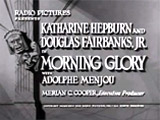
|
Morning
Glory (1933)
In director Lowell Sherman's show-business-related
romantic drama:
- small-town theatre actress
in Vermont, and aspiring Broadway performer Eva Lovelace (Oscar-winning
Katharine Hepburn, her first Oscar win) was waiting in the lobby
of a major Broadway management casting office (Lewis Easton Productions),
where she met her competition - a more experienced actress Miss
Gwendolyn Hall (Geneva Mitchell) swathed in a fur wrap, who complained
about the number of auditioners: ("Evidently
everyone else has heard it too. When I arrived here, it looked
as though the entire Actor's Equity Association had been sent for");
when Eva was asked about her thin and shabby coat, she replied
snidely: ("I like to feel cold. It makes me feel strong. I shouldn't like to
go about swathed in furs unless they're sables. I don't like anything
cheap, particularly furs")
- while waiting to speak to Easton, Eva
was befriended by kindly, paternalistic veteran stage
actor Robert Harley Hedges (C. Aubrey Smith); she explained her
name to him with her non-stop, vivacious chatterbox style: ("I
hope you're going to tell me your name. I want you for my first
friend in New York. Mine's Eva Lovelace. It's partly made up and
partly real. It was Ada Love. Love's my family name. I added the
'lace.' Do you like it, or would you prefer something shorter?
A shorter name would be more convenient on a sign. Still, 'Eva
Lovelace in Camille,' for instance, or 'Eva Lovelace in Romeo and
Juliet' sounds very distinguished, doesn't it? I don't want to
use my family name, because I'll probably have several scandals while
I live and I don't want to cause them any trouble until I'm famous
when nobody will mind. That's why I must decide on something at once
while there's still time, before I'm famous. Don't you think there's
something very charming, something that just suits me about Eva Lovelace?");
she was
even able to forcibly convince him to become her vocal coach and
mentor
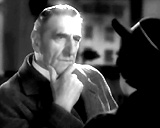
|
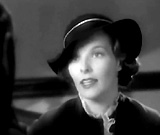
|
|
Eva Chattering About Her Name with Stage Actor
Robert Hedges
|
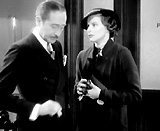 Eva with Broadway Manager-Theatre Owner Lewis
Easton
Eva with Broadway Manager-Theatre Owner Lewis
Easton
|
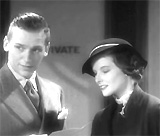 Eva with Playwright Joseph Sheridan
Eva with Playwright Joseph Sheridan
|
- stagestruck, young, inexperienced and
yearning Eva met with handsome, slimy, opportunistic,
middle-aged, philandering Broadway theatre owner-manager Lewis
Easton (Adolphe Menjou), to unabashedly promote herself, to show
him a remarkable letter from George Bernard Shaw, and to describe
her ambitious dreams of becoming a Broadway theatrical star: ("I
was in a lot of plays at the Franklin Theatre Guild - at the Little
Theater...At Franklin, Vermont, where I lived until sometime ago.
The Franklin papers, both of them, agreed that I had a future.
I play all sorts of parts. Hedda, you know, lbsen's Hedda of
course, the old woman in Riders to the Sea, the queen in The
Queen's Enemies by Dunsany, and Kitty in Shaw's You Never
Can Tell...Yes, the one and only...He's the greatest living dramatist...I know
it. By the way, I had a charming letter from him the other day.
I wrote him and sent him a photograph of a scene from the play
and told him all about it - that I was coming to New York and expected
to be very famous and have a theater of my own so I could play
his Cleopatra until I was too old for it, when I'd do Mrs. Warren's
Profession. Of course, I didn't know whether he'd ever answer my
letter or not, but here's his letter. May I read it to you? It's
never left me a moment since I received it. I even sleep with it
under my pillow"); she seemed more in love with the romanticized
idea of becoming an actress without realizing it would take talent
and hard work
- in the next sequence, earnest young playwright Joe
Sheridan (Douglas Fairbanks, Jr.), the scriptwriter of Easton's new
comedic play, became entranced with Eva's effervescence when he
overheard the conversation and took a look at the letter, also
remarking: ("Oh, this is marvelous. He says it's cheeky of them to have produced
a play of his at all. He's sure it was a, uh, piratical performance.
He's glad that Miss, uh, Miss Lovelace?...He's glad Miss Lovelace
will see that he's properly recognized when she has her own repertoire
theater and hopes she won't forget him"); the overly-dramatic
Eva replied and vowed: ("Oh, I won't. I've sworn it. There
will always be a Shaw play in my repertoire as long as I remain
in the theater. Of course, I expect to die at my zenith. My star
shall never set, I've sworn that, too. And when that moment comes,
when I feel that I've done my best, my very best, I shall really
die by my own hand some night at the end of the play on the stage"); Eva
vowed that she would never allow her talent to go into decline,
and would rather dramatically commit a farewell suicide on-stage
after doing her best and serving a useful life
- even after Easton departed, Eva continued chatting with his male assistant
Mr. Seymour (Fredric Santly) in the outer office, offering to take
any mostly-congenial role for $20 dollars a week; she then expressed
her life's philosophy as an artist who must be "free to love,
free to dream, free to sin, if you call it sin"
- after some initial career disappointments, Eva
became champagne-drunk and completely uninhibited while attending
a celebrity cocktail party held in Easton's penthouse, where she
almost sat in his lap and boasted and revealed way too much about
herself: ("I shouldn't be surprised if I'm a great actress...I shouldn't be
surprised. Either I'm a rotten actress or I'm a great actress.
I'm not just a pretty good actress. Now, sometimes, I think I'm
very, very, very bad. No good. Tonight, I think I'm wrong when
I think that. Oh, I feel wonderful, Mr. Easton. Not afraid anymore....You
see, I wasn't afraid, not for a long time. When I lost a part,
I thought it was because I was a genius, and geniuses always have
a hard time....Yes, the world never appreciates genius when it's
young. Then I began to get afraid. 'Maybe I'm crazy,' I got to
thinking. 'Maybe I'm not a genius.' And then I said, 'It's better
not to think.' In this world where but to think is to be full of
sorrow, it's better.. But tonight I'm not afraid to think though,
because I'm almost thoroughly convinced that I'm a genius again")
- after pretentiously complimenting and then bragging
to Easton: "This is a wonderful party, Mr. Easton....Yes, Mr.
Easton, I like your party...I'm the greatest young actress in the
world. I'm gonna go on getting greater and greater and greater, you'll
see...", Hedges cautioned Eva about making a fool of herself,
but she decided to prove everyone wrong: ("You're talking to
the greatest actress in the world and I'm gonna prove it to you.
Now keep quiet, all of you. And you. You, just wait a minute. Just
watch me") - and she performed a slurred-speech rendition of Hamlet's soliloquy
in front of startled party guests: ("To be or not to be - that
is the question....")
- she then went on to perform a second show-offy excerpt
from the Romeo and Juliet balcony scene, taking the part of
love-struck Juliet: ("Romeo, Romeo! Wherefore art thou Romeo?
Deny thy father and refuse thy name. Or, if thou wilt not, be but
sworn my love and I'll no longer be a Capulet...") - there was
subdued applause when she finished, and Hedges complimented her: "Stylishly
beautiful! Impossibly beautiful!" Even Easton added: "Really charming!"
- she soon became involved in a love triangle between
her Broadway manager Louis Easton and playwright Joseph Sheridan
- and finally she would
get her big break
- fifteen minutes before the
curtain debut opening on Broadway for The Golden Bough, Easton's
troubled, arrogant and temperamental blonde star-diva Miss Rita Vernon
(Mary Duncan) outrageously demanded:
"I want my name in electric lights from tomorrow on. I want a
run of the play contract to play the part in New York, on the road
and in London. I want $1,500 a week and half the profits, and a cut
in on the picture rights - Think it over!...I don't need Broadway!"
- she asserted that if she didn't get her way, she wouldn't go onstage;
Easton decided to let her go and reluctantly replaced her with her
understudy ("the little Lovelace girl") - Eva - even without a rehearsal!; Easton
returned to tell Rita of his decision - she was fired: "Since
you've decided to act in this most unprofessional manner and to take
advantage of me at a moment like this, l've decided to let you do exactly
as you please"
- after being told she would replace Rita, Eva was petrified
of failing and claimed she was too tired to act to romantic interest
Joseph Sheridan: ("Suppose I do go on tonight and I'm not wonderful?
Then everything's gone. If I can't act, there's nothing left...And
I don't think I can act"); but then she bolstered her self-confidence
and affirmed: "Oh, it was silly the way I just talked. Listen,
I'll give a performance tonight that will make you proud of me"
- after her triumphant debut performance on Broadway
in The Golden Bough, backstage, Eva's middle-aged wardrobe
woman Nellie Navarre (Helen Ware) congratulated her: "Your performance,
my dear, was inspirational. I've seen them come, and I've seen them
go. This is your moment. May God bless you while it lasts"
- Easton also congratulated Eva, but insensitively ignored
her attempts at affection (she told him: "You're in my heart").
He told her that she didn't belong to any man, but only to Broadway
and the theater: ("You must put me out of your heart. I don't
belong there, and you don't belong in mine. I'm not the man for you,
I never was. You don't belong to any man now. You belong to, to Broadway,
to theatre, lights") - causing Eva to feel emotionally devastated
-
she was praised, but also lectured and warned by Hedges about instant
success going to her head - like a "morning glory" which
bloomed beautifully, but then quickly withered and died: ("Every
year, in every theater, some young person makes a hit. Sometimes
it's a big hit, sometimes a little one. It's a distinct success,
but how many of them keep their heads? How many of them work? Youth
comes to the fore. Youth has its hour of glory. But too often, it's
only a morning glory - a flower that fades before the sun is very
high"); Hedges added that Nellie was very much like Eva - she was
an "overnight" young star years earlier who became "the
toast of the town and then faded out"
- Sheridan also expressed his love for Eva, and she
was grateful for his support and understanding: ("You've always
understood me"), but Easton's earlier rejection of her overshadowed
his declaration, and she was unable to accept it
- in the film's poignant closing
with Nellie, Eva honestly expressed her loneliness, her slight fear
and emptiness, and her loss of love. But then with her confidence
strengthened about her love for
Sheridan: ("I can make him happy, and he can make me happy"),
she embraced her tearful assistant, and declared to her that she
didn't care if she was a morning glory, speaking
defiantly. She delivered a
curtain-closing (last lines) statement, vowing that she would not
quickly blossom, wither and die like so many other performers: "Nellie,
they've all been trying to frighten me. They've been trying to frighten
me into being sensible, but they can't do it. Not now. Not yet. They've
got to let me be as foolish as I want to be. I-I want to ride through
the park. I want to, I want to have a white ermin coat. And I'll
buy you a beautiful present. And Mr. Hedges! I'll buy Mr. Hedges
a little house. And I'll have rooms full of white orchids. And they've
got to tell me that I'm much more wonderful than anyone else, because
Nellie, Nellie,
I'm not afraid. I'm not afraid of being just a morning glory. I'm
not afraid. I'm not afraid. I'm not afraid. Why should I be afraid?
I'm not afraid" - the film quickly faded
to black
- whether her quick success would be long-lasting or
withering like a "morning glory"
remained to be seen
|
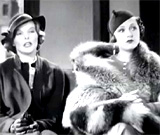
Eva in the Lobby of a Casting Office
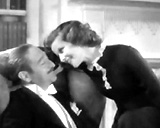
Eva's Drunken Attendance at Lewis Easton's Party: "I'm
a genius again"
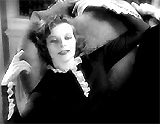
Eva: "This is a wonderful party, Mr. Easton"
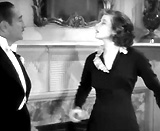
Eva: "I'm the greatest young actress in the world"
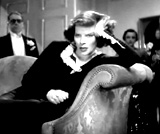
Performing Hamlet's Soliloquy
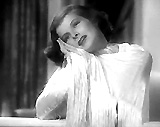
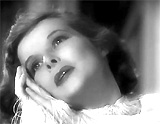
Performing An Excerpt from Romeo and Juliet Balcony
Scene
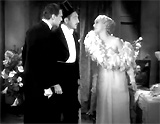
Miss Rita Vernon's Outrageous Demands Just Before
the Curtain
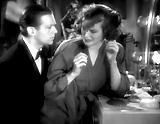
Backstage - Eva's Trepidation About Performing as
a Replacement for Rita: ("I don't think I can act")
After Eva's Debut Performance -
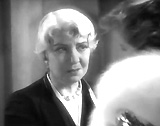
Nellie: "Your performance, my dear, was inspirational"
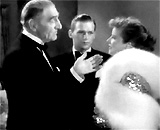
A Warning From Hedges ("But too often it's only
a morning glory...")
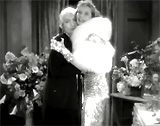
Eva in Her Dressing Room Vowing to Her Wardrobe Woman
Nellie: "I'm not afraid!"
|













